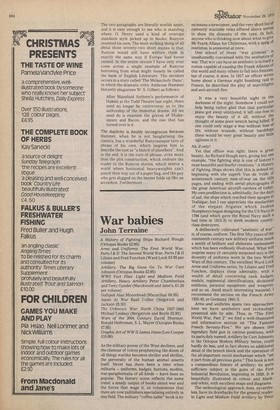A History of Fighting Ships Richard Hough (Octopus Books £2.95)
Arms and Uniforms: The First World War, Parts /& II: The Second World War, Parts f & II Liliane and Fred Funcken (Ward Lock £3.95 per volume) Artillery: The Big Guns Go To War Curt Johnson (Octopus Books £2.95) WW2 Fact Files: Light and Medium Field Artillery, Heavy Artillery Peter Chamberlain and Terry Gander (Macdonald and Jane's, £1.20 per volume) Gallipoli Alan Moorehead (Macmillan £6.95) Japan At War Basil Collier (Sidgwick and Jackson £5.50) The Unknown War: North China 1937-1945 Michael Lindsay (Bergstrom and Boyle £5.95) Wars of the 20th Century David Shermer, Ronald Heiferman, S. L. Mayer (Octopus Books £7.95) Graphic Art of WW II James Jones (Leo Cooper £10.00)
As the military power of the West declines, and the clamour of voices prophesying the doom of all things warlike becomes shriller and shriller, the perversity of the human animal asserts itself. Never has there been a time when militaria — uniforms, badges, buttons, models, war-paraphernalia of all kinds — have been so popular. The literary scene reflects the same trend: a steady output of books about war and the forces that wage it, so voluminous that there are now publishers specialising entirely in this field. The military "coffee-table" book is by no means a newcomer, and the very short list of currently available titles offered above serves to show the diversity of the type. In fact, anyone who is thinking now about what to give Mr Frank Allaun for Christmas, with a sprig of mistletoe, is answered at once.
One school of these "war glossies" is unashamedly concerned with the aesthetics of war. That war can have an aesthetic is in itself a notion capable of causing the Frank Allauns of this world and many others to fall into frenzies, but of course, it does. In 1917 an officer wrote home about a German night bombing raid In France; he described the play of searchlights ,and anti-aircraft fire: It was a very beautiful sight in the darkness of the night. Somehow I could not help being rather glad that that particular plane got away uninjured; it left one free to enjoy the beauty of it all, without the thought of some poor wretch being killed. If one could only stage a war without loss of life, without wounds, without hardshiPs there would be very great beauty and little ugliness in it.
Ah, if only!


































 Previous page
Previous page